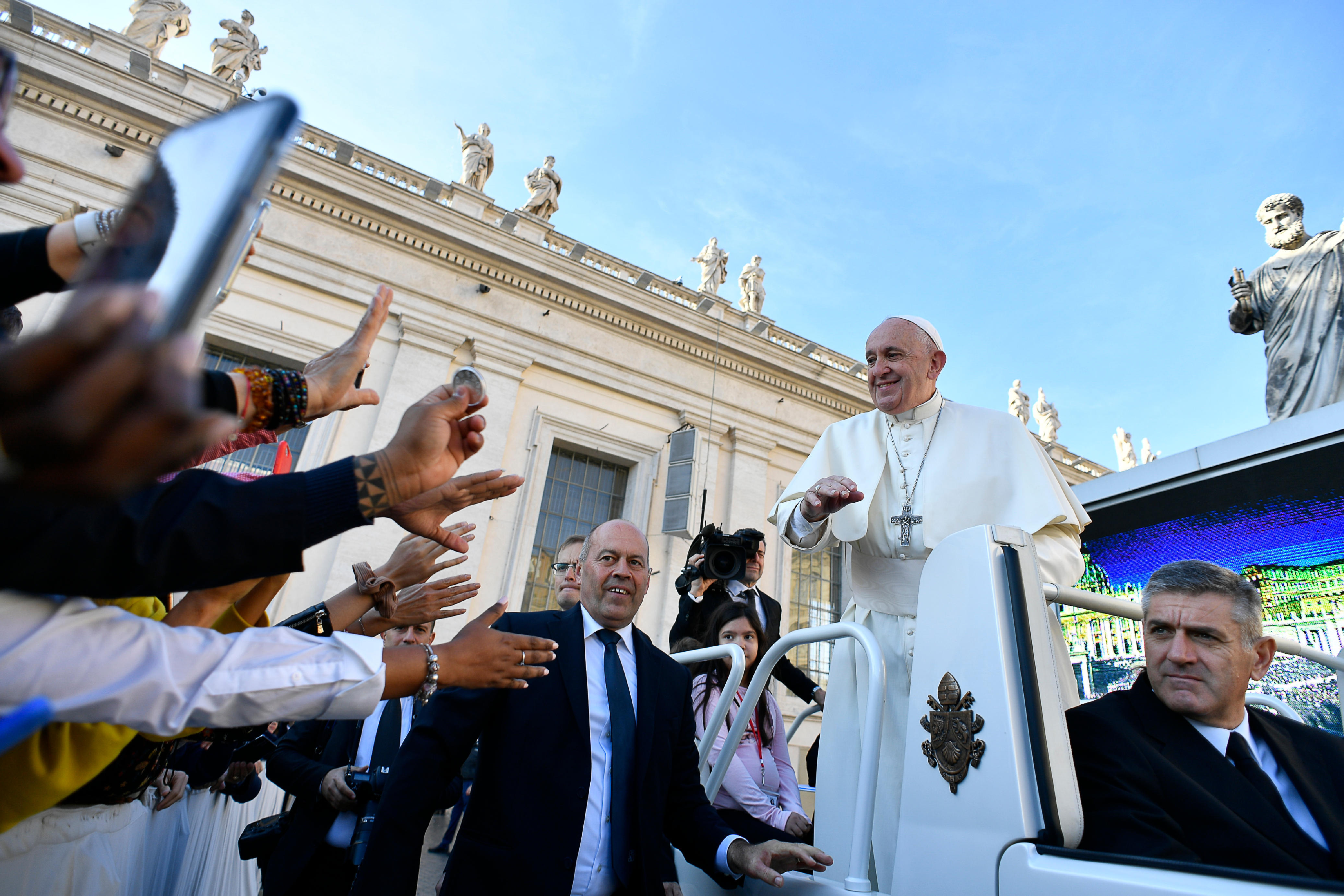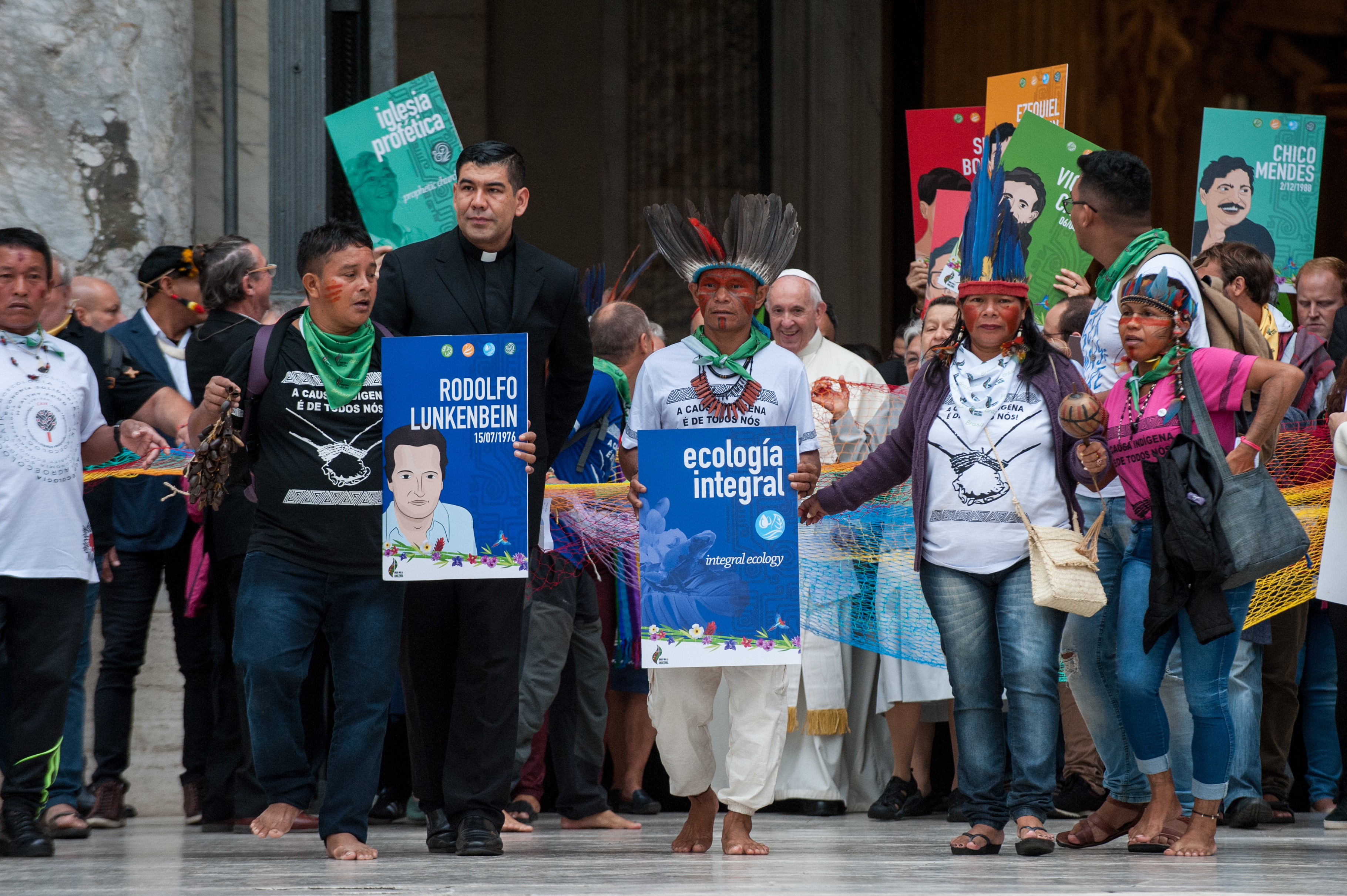“The Amazon today is a wounded and deformed beauty, a place of suffering and violence. Attacks on nature have consequences for the lives of peoples…These are real threats with serious social consequences: environmental disease, drug trafficking and smuggling, organ traffic, sex tourism, the loss of original culture and identify (language, spiritual practices and customs)…The scientific community, for its part, wants the rusks of deforestation, which to date is close to almost 17% of the whole Amazon forest, and threatens the survival of the entire ecosystem…
“Listening to the cry of the earth and the cry of the poor and of the peoples of the Amazon with whom we walk, calls us to a true and integral conversion, to a simple and most style of life, all nourished by a mystical spirituality in the style of St. Francis of Assisi."
The Church in the region
“One of the most glorious pages of the Amazon has been written by the martyrs. The participation of the followers of Jesus in his passion, death and glorious resurrection has accompanied the life of the Church to this day, especially in the moments and places in which, for the sake of the Gospel of Jesus, Christians live in the midst of acute contradictions.
“We want to be a Church in the Amazon which is Samaritan, incarnated in the way in which the Son of God became incarnate…The multi-ethnic, multi-cultural, and multi-religious reality of the Amazon demands an open attitude of dialogue, also recognising the multiplicity of interlocutors: the indigenous peoples, the river dwellers, peasants and afro-descendants, the other Christian Churches and religious dominations.
“Colonialism is the imposition of some people’s ways of life on others, whether economically, culturally or religiously. We reject a colonial style of evangelisation. Proclaiming the Good News of Jesus implies recognising the seeds of the Word already present in cultures….In the evangelising task of the Church, which should not be confused with proselytism, we must include clear processes of inculturation of our missionary methods and plans."
The ecological stance
“It is urgent to face the unlimited exploitation of our 'common home' and its inhabitants…For Christians, the interest and concern for the promotion and respect of human rights, both individual and collective, is not optional. Human beings are created in the image and likeness of God the Creator and their dignity is invaluable…It is then a question of discussing the real value that any economic or extractive activity offers…Together with the Amazon’s peoples and their horizon of ‘good living’, we are called to an individual and communal ecological conversion that safeguards en integral ecology and a model of development in which commercial criteria are not above environmental and human rights criteria."
“The Church recognises the wisdom of the Amazon peoples about biodiversity, a traditional wisdom that is a living process always underway. The theft of this knowledge is biopiracy, a form of violence against these populations. The Church must help them to preserve and maintain this knowledge and the innovations and practices of the social populations, respecting the sovereignty of counties and their laws regulating access to genetic resources and assisted traditional knowledge.”
“As a way of repaying the ecological debt that countries have with the Amazon, we propose the creation of a world fund to cover the budgets of the communities present in the Amazon which promote their integral and self-sustaining development and to also protect them from the predatory compulsion to extract their natural resources by national and multinational companies.”
“To create a pastoral socio-environmental and pastoral office to support the struggle in the defence of life. To carry to a diagnosis of the territory and its socio-environmental conflicts in each local and regional Church…”
Pastoral presence and local rite
“It is urgent for the Church to reach out pastorally, to the indigenous people in a specific way. We start from plural realities and diverse cultures to define, elaborate and adopt pastoral actions that allows us to develop a proposal of evangelisation among the indigenous communities, placing ourselves within a pastoral framework for indigenous people and their territory. The pastoral care of indigenous peoples has its own specificity.
“A Church with an Amazonian face needs its communities to be infused with a synodal spirit…As an expression of the co-responsibility of all the baptised in the Church and of the exercise of the sensus fidei of all the People of God, the assemblies and pastoral councils in all ecclesial spheres, as well as the coordination teams of the different pastoral services and the ministries entrusted to the laity came into being.
“We must give an authentically Catholic response to the request of the Amazonian communities to adapt the liturgy by valuing its worldview, traditions, symbols and original rites that include transcendent, community and ecological dimensions.
“In the Catholic Church there are 23 Rites, a clear sign of a tradition that forms the first centuries has tried to inculturate the contents of the faith and its celebration through a language as coherent as possible with the mystery that is to be expressed.
“It is necessary that the Church, in her tireless evangelising work, work so that the process of inculturation of the faith may be expressed in the most coherent forms…preserving the material of the sacraments and adapting them to the form, without losing sight of what is essential.
“The new organism of the Church in the Amazon must constitute a competent commission to study and dialogue, according to the customs of the ancestral peoples, the elaboration of an Amazonian rite that expresses the liturgical, theological, disciplinary and spiritual patrimony of the Amazon…This would add to the rites already present in the Church, enriching the work of evangelisation, the capacity to express the faith in a proper culture, and the sense of decentralisation and collegiality that the catholicity of the Church can express…
Viri probati and vocation in the Amazonian Church
“For the Amazon Church, the promotion, formation and support of permanent deacons is urgent because of the importance of this ministry for the community. This is so in a particular way because of the needs of ecclesial service by many communities, especially indigenous peoples. The specific pastoral needs of the Amazonian Christian communities lead us to a broader understanding of the diaconate, a service that has existed since the beginning of the Church, and restored as an autonomous and permanent grade by the Second Vatican Council.
“Considering that legitimate diversity does not harm the communion and unity of the Church, but expresses and serves it…we propose to establish criteria and dispositions on the part of the competent authority…to ordain priests suitable and esteemed men of the community, who have had a fruitful permanent diaconate and receive an adequate formation for the priesthood, having a legitimately constituted and stable family, to sustain the life of the Christian community through the preaching of the Word and the celebration of the Sacraments in the most remote areas of the Amazon region.
Recognition of women and their roles
“The ancestral wisdom of the peoples affirms that mother earth has a female face. In the indigenous and western world, women are those who work in multiple facets, in the instruction of children, in the transmission of faith and the Gospel, they are a witness and responsible commitment in human promotion, so that the voice of women can be heard, they are consulted and participate in decision-making and, in this way, can contribute with their sensitivity to ecclesial synodality.
“We secure [women’s] role in leadership and formation. In the new context of evangelisation and pastoral ministry in the Amazon, where the majority of Catholic communities are led by women, we ask for the institution of ministry for 'women leadership of the community' be created and recognised within the service of the changing demands fo evangelisation and community care.
“In the many consultations carried out in the Amazon, the fundamental role of religious and lay women in the Church of the Amazon and its communities was recognised and emphasised, given the multiple services they provide. In a large number of these consultations, the permanent diaconate for women was requested…We would therefore like to share our experiences and reflections with the [Commission on the Diaconate of Women set up in 2016] and await its results.”



 Loading ...
Loading ...